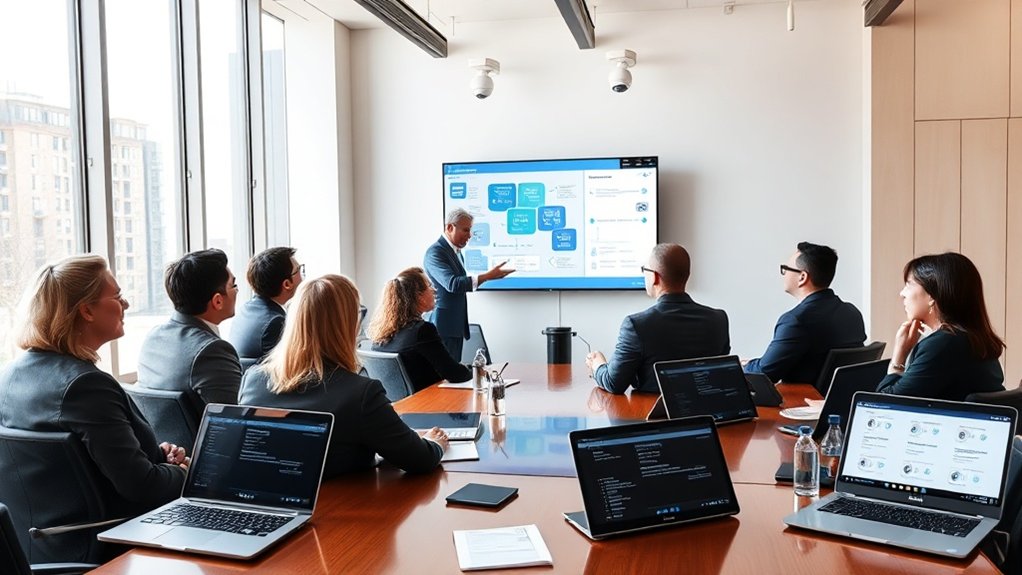When handling sensitive information like the Afghan Files, you can’t afford missteps in data privacy or LGPD compliance. With public and regulatory scrutiny rising, your organization needs tailored legal strategies that protect both data and reputation. Vieira Braga Advogados guides you through these complexities, from legal frameworks to secure processes. But what about responding to an actual breach or training your team to spot risks before they hit? There’s more you should know.
Understanding the Significance of the Afghan Files in Data Protection

Although the Afghan Files primarily exposed issues within military operations, their publication underscored the paramount importance of robust data protection practices. When you look at how these confidential documents were accessed and shared, you realize just how vulnerable sensitive data can be without strong safeguards. It’s a powerful reminder that any organization holding classified or sensitive information must take data privacy seriously. You can’t afford to overlook the measures needed to prevent unauthorized access and potential leaks.
For law firms, businesses, and individuals alike, the Afghan Files show that data breaches don’t just risk information—they expose organizations to legal, ethical, and reputational harm. When you implement strict security protocols and ensure compliance with regulations like the LGPD, you’re not just ticking boxes. You’re actively protecting your assets, your clients, and your reputation. By learning from incidents like this, you’ll be better equipped to guard data in today’s digital world.
Just as with immigration law, maintaining personalized legal support is essential for navigating complex compliance landscapes and avoiding costly errors in data privacy management.
Key Challenges in Processing Sensitive Data Under LGPD
While the LGPD lays out clear requirements for protecting sensitive data, navigating its complexities presents unique challenges for organizations. You must classify and handle sensitive data—such as racial origin, health information, or political opinions—with the utmost care to avoid severe penalties. Obtaining explicit consent from data subjects becomes difficult, especially when data processing is urgent or ongoing. Additionally, you need to establish robust technical and administrative safeguards, which can require significant investment in new technologies and staff training.
Another challenge is maintaining transparency while managing requests for data access, correction, or deletion. These requests can increase significantly when dealing with sensitive information. You’ll also need to ensure that third-party vendors comply with LGPD standards, which adds another layer of risk. If you process international data transfers, strict restrictions and review processes apply. Ultimately, keeping up with evolving interpretations of the law and ensuring continuous compliance can feel overwhelming without expert guidance.
Having the guidance of a specialized lawyer not only helps clarify legal obligations, but also significantly reduces common errors that may delay or jeopardize compliance efforts.
Legal Obligations for Institutions Handling High-Profile Cases

Given the heightened public and regulatory scrutiny surrounding high-profile cases, institutions must strictly adhere to the legal obligations imposed by the LGPD. You’re not just protecting data—you’re safeguarding reputations, legal standing, and the trust of everyone involved. When handling such sensitive matters, it’s crucial that you implement robust privacy practices and demonstrate full compliance at every stage. The LGPD lays out clear mandates for data processing, protection, and accountability, especially when the stakes are high.
To stay compliant, make sure you:
- Obtain explicit consent: Don’t process any sensitive data without clear and informed consent from data subjects.
- Maintain transparency: Clearly inform individuals about how you collect, use, and share their information.
- Enable data subject rights: Facilitate requests for access, correction, or deletion of data promptly.
Ignoring these requirements isn’t just risky—it can result in severe penalties, reputational harm, and lasting consequences for your institution. By seeking professional legal guidance, you significantly increase your institution’s ability to navigate complex regulatory challenges and reduce the risk of compliance failures.
How Vieira Braga Advogados Addresses Data Security Risks
Meeting LGPD requirements is only the starting point—taking proactive steps to address data security risks is what sets Vieira Braga Advogados apart. When you trust this team, you’re not just checking boxes; you’re ensuring your sensitive data stays protected against constantly evolving threats. Vieira Braga Advogados leverages advanced cybersecurity measures, continuous monitoring, and rapid response protocols to safeguard your data. Their policy isn’t just about compliance—it’s about anticipating risks before they damage your reputation or compromise your clients.
You’ll feel the difference in how seriously they treat privacy. Every action, every safeguard, is designed with your peace of mind at the center. Transparency drives their operations, so you’re never left guessing if your organization’s data is secure.
No matter the size of your operation, having personalized and updated guidance from legal specialists ensures your compliance and security strategies stay ahead of ever-changing requirements.
Here’s a glimpse of how data security impacts you emotionally and professionally:
| Risk | Consequence | Emotion |
|---|---|---|
| Data Breach | Reputational hit | Anxiety |
| Unauthorized Access | Financial loss | Vulnerability |
| Regulatory Fines | Legal trouble | Frustration |
| Strong Protections | Trust | Confidence |
Practical Steps for Achieving LGPD Compliance

To achieve LGPD compliance, you need to start with thorough data mapping and assessment. Once you understand where and how personal data flows, you can implement targeted security measures that truly protect sensitive information. Legal experts emphasize that organized and updated documentation expedites the compliance process and minimizes risks of regulatory penalties. Let’s look at how both steps set a strong foundation for compliance.
Data Mapping and Assessment
A thorough understanding of your organization’s data flows forms the backbone of LGPD compliance. You need to identify exactly what personal data you collect, how it moves through your systems, and who can access it. Data mapping lets you expose hidden risks and pinpoint compliance gaps. Start by cataloging all data sources, from employee records to customer forms. Don’t overlook third-party processors or cloud storage. Assess each data point’s purpose and storage location to ensure you’re handling everything appropriately and lawfully under LGPD.
Seeking professional legal support, such as specialized legal support, can help you navigate complex LGPD requirements and minimize the risk of regulatory penalties during this process.
Here’s how you can approach data mapping and assessment effectively:
- List all types of personal data collected and processed.
- Track every movement and transfer of this data inside and outside your organization.
- Verify which teams and partners have access to each data category.
Security Measures Implementation
Once you’ve mapped and assessed your data, the next step is to put strong security measures in place to protect that information. You’ll need to adopt both technical and organizational safeguards. Start by encrypting sensitive data at rest and in transit. Set up strict access controls—only authorized personnel should handle personal data. Implement multi-factor authentication, regular password updates, and monitor access logs for any unusual activities.
You can reduce risks by conducting vulnerability assessments and penetration tests. Keep all software and security tools updated to defend against new threats. Develop clear policies for handling and reporting security incidents. Train your team regularly on privacy best practices. By following these steps, you’ll significantly strengthen your organization’s LGPD compliance and reduce potential data breach risks. If you encounter uncertainties regarding data privacy or regulatory obligations, seeking professional guidance is crucial to avoid overlooked details and ensure compliance throughout the process.
Incident Response and Breach Notification Strategies
You need a clear plan for spotting incidents quickly and letting stakeholders know without delay. Rapid detection protocols help you limit damage and stay compliant with LGPD. Don’t underestimate the importance of timely notifications to maintain trust and meet legal obligations. Consulting with immigration lawyers in RJ can also help ensure that your breach notification strategies are both legally sound and tailored to the complexities of Brazilian regulations.
Rapid Detection Protocols
While data breaches can happen unexpectedly, organizations must act swiftly to identify and contain incidents. You need to have rapid detection protocols in place to quickly spot and respond to unauthorized access or suspicious activities. The quicker you detect an incident, the more effectively you can limit potential damage and safeguard sensitive data. Proactive monitoring, real-time alerts, and regular audits form the backbone of robust detection strategies.
Consider implementing the following elements for more effective incident response:
- Automated monitoring systems: Continuously scan your network for unusual patterns or unauthorized access attempts.
- Centralized logging tools: Collect, correlate, and analyze logs from various sources for faster detection of anomalies.
- Routine vulnerability assessments: Regularly examine infrastructure to identify and patch weak points before attackers exploit them.
Working with specialized legal support can help ensure your incident response strategies align with regulatory requirements and minimize the risk of penalties or compliance issues.
Timely Stakeholder Notification
Even the most robust prevention protocols can’t guarantee absolute security, so clear and timely communication during a data incident is essential. You must notify all relevant stakeholders as soon as a breach is confirmed, including clients, partners, and regulators. The LGPD requires organizations to communicate incidents that may compromise personal data, specifying what data was affected, possible risks, and measures you’re taking to resolve the issue.
Don’t delay—quicker notifications help limit harm and build trust. Prepare templates and designate a response team in advance to ensure you meet notification deadlines and avoid confusion. By acting promptly and transparently, you show your commitment to data protection. Keep records of your notifications and provide updates as new information emerges. Proper notification isn’t just compliance—it’s responsible governance. Seeking legal guidance during a data incident can help organizations avoid costly mistakes and protect their stakeholders’ rights.
Employee Training and Internal Policies for Data Privacy

A robust approach to data privacy starts with well-trained employees and clear internal policies. You play a crucial role in protecting sensitive information, and your organization depends on your vigilance. To meet LGPD requirements, make sure you’ve got regular, practical training that covers how to recognize risks and respond to incidents. Policies shouldn’t just exist on paper—they need to guide daily work and be easily accessible to all staff.
When you focus on employee training and internal rules, you minimize accidental breaches and foster a culture of data responsibility. Regular audits and updates ensure your practices stay relevant as regulations evolve. Consider these essential elements:
- Conduct interactive training sessions so you understand practical privacy scenarios.
- Update internal guidelines to reflect the latest legal obligations and best practices.
- Perform routine assessments to identify gaps and reinforce compliance.
When everyone understands their role, your organization stands stronger against data privacy challenges.
Building Trust Through Transparent Data Governance
Strong employee training and clear internal policies lay the groundwork, but your organization can’t achieve lasting data privacy without earning the trust of those whose information you handle. Transparent data governance is key. You need to clearly state what data you collect, why you collect it, and how you use it. Don’t keep this information hidden—communicate it openly through accessible privacy notices and easy-to-understand consent forms.
If someone asks about their data, respond quickly and honestly. Show respect by letting people access, correct, or delete their information as allowed by law. Make it easy for them to exercise their rights without obstacles. Document your processes so you can demonstrate compliance if challenged.
Consistency and transparency reassure stakeholders that you treat their information responsibly. When your data governance is clear and accessible, you’ll build strong, enduring trust—not just with customers, but also with partners and regulators. Transparency is your foundation for compliance and credibility.
Frequently Asked Questions
What Services Does Vieira Braga Advogados Offer Outside Data Privacy and LGPD Compliance?
You’ll find that Vieira Braga Advogados offers a broad range of legal services beyond data privacy and LGPD compliance. They can assist you with corporate law, contracts, labor law, civil litigation, tax planning, mergers and acquisitions, and intellectual property. Whether you need risk management, regulatory guidance, or help structuring business operations, they apply their expertise to protect your interests. Their team ensures you’re legally compliant and well-advised in various business matters.
How Can Clients Contact Vieira Braga Advogados for Legal Consultations?
You can contact Vieira Braga Advogados for legal consultations through several easy methods. You can call their main office phone number, send an email, or use the contact form on their official website. If you prefer in-person communication, you can schedule a visit to their office. Make sure to provide your name, contact details, and a brief description of your legal needs so they can assist you efficiently and promptly.
What Industries Does Vieira Braga Advogados Primarily Serve?
You’ll find that Vieira Braga Advogados primarily serves industries like technology, healthcare, finance, retail, and telecommunications. If you work in any of these sectors, you’ll benefit from their expertise, especially regarding data privacy and regulatory compliance. The firm understands your industry’s unique legal requirements and adapts strategies to keep you compliant with evolving regulations. Whether you’re a startup or a large corporation, you can count on their tailored guidance for your sector-specific needs.
Are There Multilingual Support Services Available at Vieira Braga Advogados?
Yes, you’ll find multilingual support services available at Vieira Braga Advogados. You don’t have to worry about language barriers because their team can assist you in several languages, including English and Portuguese. This way, you’re always clear about your legal position and requirements. Whether you’re handling international matters or need help communicating complex legal terms, you’ll get the language support you need for effective and smooth communication throughout your engagement.
Does Vieira Braga Advogados Assist With International Data Transfer Issues?
Yes, you’ll find that Vieira Braga Advogados assists with international data transfer issues. They guide you through complex regulations, ensuring your cross-border data transfers comply with Brazilian LGPD and relevant international laws. You don’t have to navigate intricate requirements alone—they’ll help you assess risks, draft transfer agreements, and implement safeguards. Rely on their expertise to keep your business legally secure while transferring data across international borders. You stay compliant and confident.
Conclusion
By partnering with Vieira Braga Advogados, you’re taking the smart route to data privacy and LGPD compliance, especially when handling sensitive cases like the Afghan Files. You’ll benefit from tailored legal advice, robust cybersecurity, and proactive training—ensuring you’re always one step ahead of risks. Trust their expertise to protect your organization’s reputation and assets, while building a culture of transparency and accountability. With their guidance, you’ll confidently navigate data protection challenges in today’s complex, high-stakes environment.




